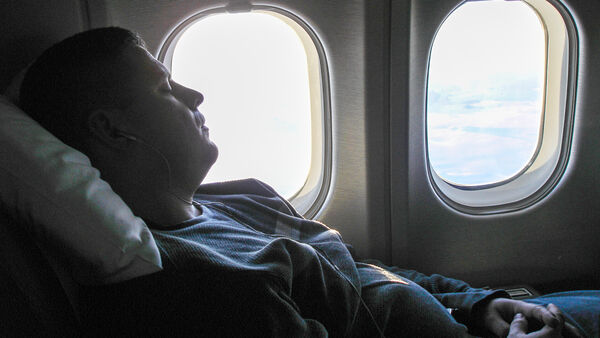Conquering Jet Lag
By Rick Steves
Anyone who flies through multiple time zones will grapple with the biorhythmic confusion known as jet lag. Flying from the US to Europe, you switch your wristwatch six to nine hours forward. Your body says, "Hey, what's going on?" Body clocks don't reset so easily. All your life you've done things on a 24-hour cycle. Now, after crossing the Atlantic, your body wants to eat when you tell it to sleep and sleep when you tell it to enjoy a museum.
Too many people assume their first day will be made worthless by jet lag. But most people I've traveled with, of all ages, have enjoyed productive— even hyper — first days. You can't avoid jet lag, but by following these tips you can minimize the symptoms.
Leave home well rested. Flying halfway around the world is stressful. If you leave frazzled after a hectic last night and a wild bon voyage party, there's a good chance you won't be healthy for the first part of your trip. An early trip cold was a regular part of my vacation until I learned this very important trick: Plan from the start as if you're leaving two days before you really are. Keep that last 48-hour period sacred (apart from your normal work schedule), even if it means being hectic before your false departure date. Then you have two orderly, peaceful days after you've packed so that you are physically ready to fly. Mentally, you'll be comfortable about leaving home and starting an adventure. You'll fly away well rested and 100 percent capable of enjoying the bombardment of your senses that will follow.
Use the flight to rest and reset. In-flight movies are good for one thing — nap time. With a few hours of sleep during the transatlantic flight, you'll be functional the day you land. When the pilot announces the European time, reset your mind along with your wristwatch. Don't prolong jet lag by reminding yourself what time it is back home. Be in Europe.
On arrival, stay awake until an early local bedtime. If you doze off at 4 p.m. and wake up at midnight, you've accomplished nothing. Plan a good walk and stay out until early evening. Jet lag hates fresh air, daylight, and exercise. Your body may beg for sleep, but stand firm: Refuse. Force your body's transition to the local time.
You'll probably awaken very early on your first morning. Trying to sleep later is normally futile. Get out and enjoy a "pinch me, I'm in Europe" walk, as merchants set up in the marketplace and the town slowly comes to life. This may be the only sunrise you'll see in Europe.
Consider jet-lag cures. The last thing I want to do is promote a pharmaceutical, but I must admit that the sleep aid zolpidem (commonly sold as Ambien) has become my friend in fighting jet lag. Managing a good seven hours of sleep a night in Europe (or after flying home) hastens my transition to local time. That way, I'm not disabled by sleepiness that first afternoon and can stay awake until a decent bedtime. Zolpidem can have side effects, and if misused, can be habit-forming; consult your doctor, and read and follow the directions carefully.
Other travelers rave about melatonin, a hormone that helps recalibrate your internal clock (available over the counter in the US but generally only by prescription in Europe).
Bottom Line: The best prescription is to leave home unfrazzled, minimize jet lag's symptoms, adopt European time, and enjoy your trip from the moment you step off the plane.


